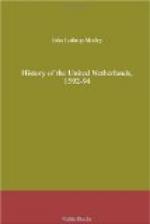The Hollanders replied, that, according to their contract with England, they were at liberty to send as many as forty or fifty vessels at a time to Spain and Portugal, that they had never exceeded the stipulated number, that England freely engaged in the same traffic herself with the common enemy, that it was not reasonable to consider cordage or dried fish or shooks and staves, butter, eggs, and corn as contraband of war, that if they were illegitimate the English trade was vitiated to the same degree, and that it would be utterly hopeless for the provinces to attempt to carry on the war, except by enabling themselves, through the widest and most unrestricted foreign commerce, even including the enemy’s realms, to provide their nation with the necessary wealth to sustain so gigantic a conflict.
Here were ever flowing fountains of bitterest discussion and recrimination. It must be admitted however that there was occasionally an advantage in the despotic and summary manner in which the queen took matters into her own hands. It was refreshing to see this great sovereign—who was so well able to grapple with questions of State, and whose very imperiousness of temper impelled her to trample on shallow sophistries and specious technicalities—dealing directly with cases of piracy and turning a deaf ear to the counsellors, who in that, as in every age, were too prone to shove by international justice in order to fulfil municipal forms.
It was, however, with much difficulty that the envoy of the republic was able to obtain a direct hearing from her Majesty in order to press the long list of complaints on account of the English piratical proceedings upon her attention. He intimated that there seemed to be special reasons why the great ones about her throne were disposed to deny him access to the queen, knowing as they did in what intent he asked for interviews. They described in strong language the royal wrath at the opposition recently made by the States to detaching the English auxiliaries in the Netherlands for the service of the French king in Normandy, hoping thereby to deter him from venturing into her presence with a list of grievances on the part of his government. “I did my best to indicate the danger incurred by such transferring of troops at so critical a moment,” said Noel de Canon, “showing that it was directly in opposition to the contract made with her Majesty. But I got no answer save very high words from the Lord Treasurer, to the effect that the States-General were never willing to agree to any of her Majesty’s prepositions, and that this matter was as necessary to the States’ service as to that of the French king. In effect, he said peremptorily that her Majesty willed it and would not recede from her resolution.”
The envoy then requested an interview with the queen before her departure into the country.
Next day, at noon, Lord Burghley sent word that she was to leave between five and six o’clock that evening, and that the minister would be welcome meantime at any hour.




